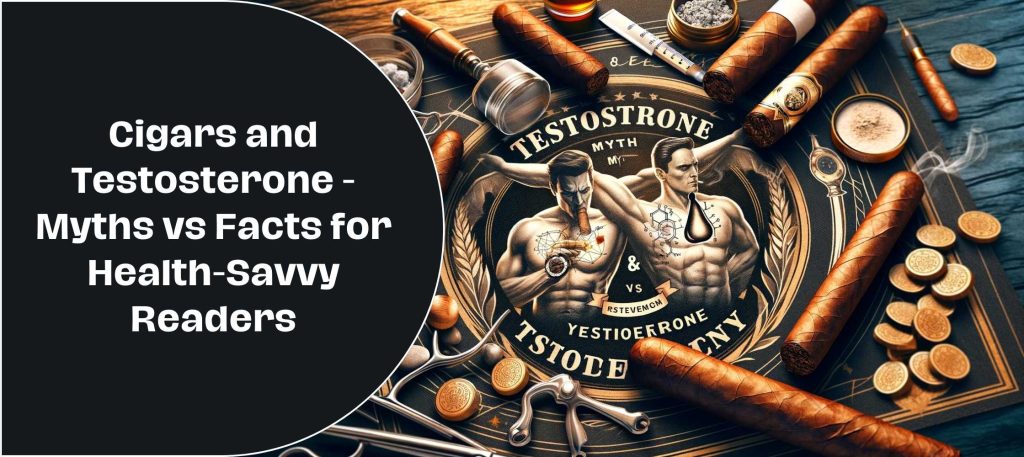|
Getting your Trinity Audio player ready...
|

Have you ever pondered over the rich, aromatic world of cigars and wondered if they do more than just offer a sense of luxury? Specifically, do they have an impact on testosterone levels? This question has intrigued many, especially given the age-old association of cigars with a certain masculine aura. Let’s embark on a journey to uncover the truth behind cigars and testosterone, weaving through scientific insights and societal perceptions.
Understanding Testosterone
Testosterone – it’s not just a buzzword in health and fitness circles. This hormone plays a pivotal role in the male body, influencing everything from muscle mass to mood. Commonly, lifestyle choices like diet and exercise are known to affect testosterone levels. But there’s more to this hormone than meets the eye.
For instance, did you know that your age could significantly influence your testosterone levels? As men age, it’s natural for these levels to decline, which often leads to a heightened interest in ways to maintain or boost this vital hormone.
The Cultural Connection Between Cigars and Masculinity
Cigars have long been a symbol of power and masculinity, at least in the societal sense. Think of Winston Churchill – his image almost inseparable from his iconic cigar. This cultural imagery often leads to a common belief: smoking cigars might boost masculinity, embodied by increased testosterone levels.
But is this belief grounded in fact, or is it a mere byproduct of societal stereotypes? Understanding this cultural backdrop is crucial in unraveling the myth or reality of cigars’ influence on testosterone.
Scientific Perspective on Cigars and Testosterone
Now, let’s delve into the heart of the matter. Does lighting up a cigar really elevate testosterone levels? Contrary to popular belief, the relationship between smoking cigars and testosterone levels is not as straightforward as many might think. Studies, including one mentioned on Healthy Choice Reviews, have found no significant effect of cigar smoking on testosterone levels. In fact, a study cited in the article indicated that cigar smokers might have slightly lower testosterone levels than non-smokers, though this was not statistically significant.
Moreover, Jamin V. Brahmbhatt, MD, a board-certified urologist, noted in an article on Team Wellcore that while smoking might temporarily increase testosterone levels through a stress response mechanism, this is a fleeting boost and doesn’t translate into long-term benefits. Instead, long-term smoking has been linked with reduced testosterone levels and other health risks like chronic respiratory diseases and lung cancer.
Therefore, while the myth of cigars boosting testosterone persists in cultural narratives, scientific evidence paints a different picture. The temporary increase in testosterone levels observed in some smokers is misleading and should not be considered a viable method for long-term testosterone enhancement.
Health Implications of Cigar Smoking
Picture this: A group of friends, gathered in a plush, dimly lit room, laughing and chatting over hand-rolled cigars. It’s an image that exudes relaxation and camaraderie. But let’s pause and look behind the smoke. Smoking cigars isn’t just a statement of leisure; it carries significant health implications.
The Unseen Risks
Cigars, like their cousin cigarettes, pack a punch of health risks. While indulging in a cigar might seem like a rare treat, the risks associated with smoking – even occasionally – are far from insignificant. Long-term cigar smoking has been linked to various forms of cancer, including lung, oral, and throat cancer. And there’s more: heart disease and chronic obstructive pulmonary disease (COPD) are also on the list of potential hazards.
Testosterone and Beyond
But what about testosterone, our main focus? While the myth persists that cigar smoking might boost testosterone, the reality is less appealing. As we’ve seen, the temporary hormonal spike from the stress response of smoking is fleeting. In the long game, regular smoking can lead to decreased testosterone levels and, perhaps surprisingly, reproductive issues. Imagine a young couple, struggling to conceive, unaware that the occasional cigar could be a silent adversary.
A Word of Caution
So, should we embrace cigars as a guilty pleasure or shun them for our health’s sake? While moderation is key in many aspects of life, when it comes to smoking cigars, the balance tilts heavily towards caution. The temporary allure of a cigar’s aroma and the status it might confer cannot outweigh the lasting impact on one’s health.
Conclusion and Recommendations
As we reach the end of our exploration, it’s clear that the question “Do cigars increase testosterone?” opens a Pandora’s box of health considerations. The fleeting surge in testosterone that some cigar smokers experience is overshadowed by the long-term health risks associated with this habit.
If boosting testosterone is the goal, there are far safer and more effective paths. Regular exercise, a balanced diet, and adequate sleep are proven, natural ways to maintain healthy testosterone levels. For those in need of an extra push, consulting a healthcare professional for advice on supplements or lifestyle changes is a prudent approach.
The Final Puff
In conclusion, while the cultural allure of cigars and their perceived link to masculinity and power is deeply ingrained, it’s essential to separate myth from reality. Smoking cigars, far from being a booster, can be a detriment to not only testosterone levels but also overall health.
We leave you with this thought: Next time you consider lighting up a cigar, remember the invisible cost that comes with each puff. In the quest for health and vitality, sometimes the best choice is the one we decide not to make.
- Unlocking Els Pet: A Comprehensive Guide For New Purchasers - August 9, 2024
- Laser Hair Removal Costs in the US – Complete Guide - April 13, 2024
- Quinoa for Weight Loss – Effective Tips & Healthy Recipes - April 1, 2024
